
Published by Collins An imprint of HarperCollins Publishers Westerhill Road Bishopbriggs Glasgow G64 2QT Second Edition 2015 HarperCollins Publishers 2010, 2015 eBook Edition March 2015 ISBN 978-0-00-758365-2 Version: 2015-01-27 Collins is a registered trademark of HarperCollins Publishers Limited www.collins.co.uk/childrensreference All rights reserved under International and Pan-American Copyright Conventions. By payment of the required fees, you have been granted the non-exclusive, non-transferable right to access and read the text of this e-book on screen. No part of this text may be reproduced, transmitted, downloaded, decompiled, reverse engineered, or stored in or introduced into any information storage and retrieval system, in any form or by any means, whether electronic or mechanical, now known or hereinafter invented, without the express written permission of HarperCollins. Entered words that we have reason to believe constitute trademarks have been designated as such. However, neither the presence nor absence of such designation should be regarded as affecting the legal status of any trademark. The contents of this publication are believed correct at the time of printing.
Nevertheless the publisher can accept no responsibility for errors or omissions, changes in the detail given or for any expense or loss thereby caused. HarperCollins does not warrant that any website mentioned in this title will be provided uninterrupted, that any website will be error free, that defects will be corrected, or that the website or the server that makes it available are free of viruses or bugs. For full terms and conditions please refer to the site terms provided on the website. If you would like to comment on any aspect of this book, please contact us at the given address or online. E-mail:  @Collins4Parents Acknowledgements We would like to thank those authors and publishers who kindly gave permission for copyright material to be used in the Collins Corpus. We would also like to thank Times Newspapers Ltd for providing valuable data.
@Collins4Parents Acknowledgements We would like to thank those authors and publishers who kindly gave permission for copyright material to be used in the Collins Corpus. We would also like to thank Times Newspapers Ltd for providing valuable data.
Contents A dictionary helps you to find out what a word means and how to spell it correctly. The words in a dictionary are arranged in alphabetical order. How to find a word Think of the first letter in the word you want to look up. Once you know this, there is more than one way to find your word in the dictionary: You can use the at the back of the ebook which lists all of the dictionary words in alphabetical order. Scroll through the Index until you find the letter your word begins with, then look down the words until you find the one you are looking for. You can then follow the link to the entry in the dictionary.
You can use the page at the front of the book, which has a link to every letter in the dictionary. Follow the link to the letter your word begins with, then look through the entries in this letter until you find the word you are looking for. Finding your way around the dictionary The headword is the word you are looking up. After the headword there can be other forms of the word, such as plural nouns, verb tenses, and comparative and superlative adjectives. The part of speech tells you what type of word the headword is, such as a noun, verb, adjective, adverb, or pronoun. The definition tells you what the word means.
If the headword has more than one meaning, each meaning has a different number . Sometimes there is an example to show how the word is used.  A pronunciation shows you how to say a difficult word. A word history tells you where a word originally came from.
A pronunciation shows you how to say a difficult word. A word history tells you where a word originally came from.  Some entries have a related word , such as a noun, adjective, or adverb made from the headword. Synonyms , or words that you can use instead, are given for some words.
Some entries have a related word , such as a noun, adjective, or adverb made from the headword. Synonyms , or words that you can use instead, are given for some words.
Antonyms , or words that have the opposite meaning, are given for some words.  Other features of this dictionary Some headwords can be spelt in more than one way. medieval ; also spelt mediaeval age ages, ageing or aging, aged Sometimes definitions include a label, such as FORMAL , INFORMAL , or TRADEMARK . This tells you a little more about the word or how it is used. mum mums NOUN INFORMAL mother Sometimes a photo or an illustration is included. mollusc molluscs NOUN an animal with a soft body and no backbone.
Other features of this dictionary Some headwords can be spelt in more than one way. medieval ; also spelt mediaeval age ages, ageing or aging, aged Sometimes definitions include a label, such as FORMAL , INFORMAL , or TRADEMARK . This tells you a little more about the word or how it is used. mum mums NOUN INFORMAL mother Sometimes a photo or an illustration is included. mollusc molluscs NOUN an animal with a soft body and no backbone.
Snails, slugs, clams and mussels are all molluscs . 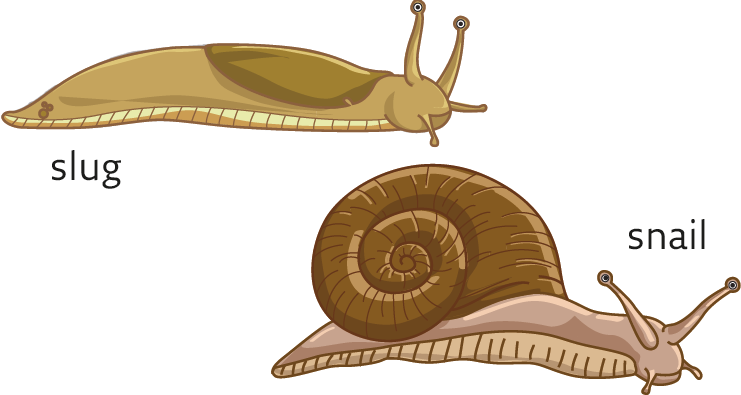 Grammar and spelling tips provide extra information on the spelling or use of words. different ADJECTIVE If one thing is different from another, it is not like it.
Grammar and spelling tips provide extra information on the spelling or use of words. different ADJECTIVE If one thing is different from another, it is not like it.  There are two e s in different . Some definitions tell you where to find more information at another headword. convex ADJECTIVE A convex surface bulges outwards, rather than being level or curving inwards.
There are two e s in different . Some definitions tell you where to find more information at another headword. convex ADJECTIVE A convex surface bulges outwards, rather than being level or curving inwards.
See ANTONYM : concave Extra help for you is a special section after the A-Z to help you with your writing. It contains information on things like parts of speech, prefixes, suffixes, and punctuation. It also tells you how you can improve your spelling. There are interesting facts about where some words come from. It even has information on shapes, numbers, fractions, and angles, along with pictures. is a fact-filled section with colourful pictures.
This is where to look if you want to know more about the Solar System, the Earth, the Moon, the continents, and the worlds mountains, rivers, and oceans. There are also pages showing you the flags of some of the nations of the world. a an ADJECTIVE A and an are used when you talk about one of something. A is used when the next sound is a consonant: a car , a dog . An is used when the next sound is a vowel (a, e, i, o or u): an apple, an elephant . abacus abacuses NOUN a frame with beads that slide along rods, used for counting [from Greek abax meaning board covered with sand for doing sums on] abandon abandons, abandoning, abandoned VERB If you abandon someone or something, you leave them or give them up for good.
He abandoned all hope of catching the train on time. abbey abbeys NOUN a church with buildings attached to it in which monks or nuns live abbreviation abbreviations NOUN a short form of a word or phrase N is an abbreviation for North. abdomen abdomens NOUN the front part of your body below your chest, containing your stomach and intestines abdominal ADJECTIVE ability abilities NOUN If you have ability , you have the intelligence and skill to do things. able ADJECTIVE If you are able to do something, you can do it. ANTONYM : unable abnormal ADJECTIVE not normal or usual abnormally ADVERB aboard PREPOSITION OR ADVERB If you are aboard a plane or a ship you are on it. a book about London You say about in front of a number to show it is not exact. about two oclock PHRASE If you are about to do something, you are just going to do it. about two oclock PHRASE If you are about to do something, you are just going to do it.
He was about to leave. above PREPOSITION OR ADVERB If one thing is above another, it is higher up. The plane was flying above the clouds. ANTONYM : below abroad ADVERB If you go abroad , you go to another country. abscess abscesses NOUN a painful swelling on the body, which contains pus abseil abseils, abseiling, abseiled VERB If you abseil down a rock face, you use ropes to go down it. absent ADJECTIVE If you are absent from a place, you are not there.

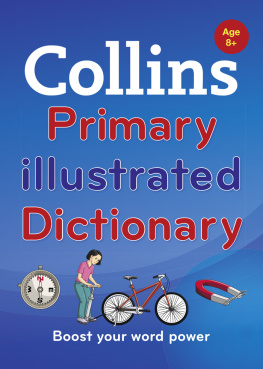
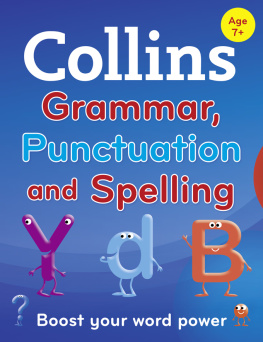
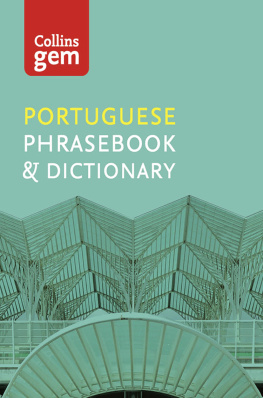

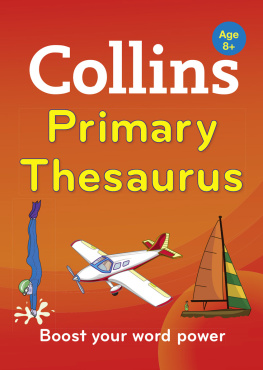
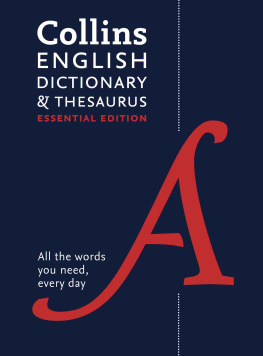

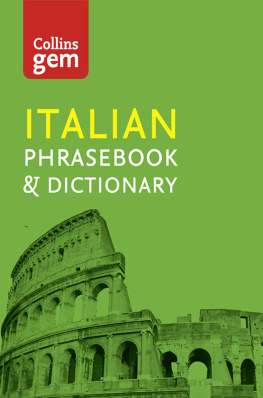
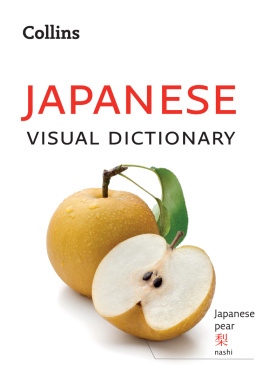

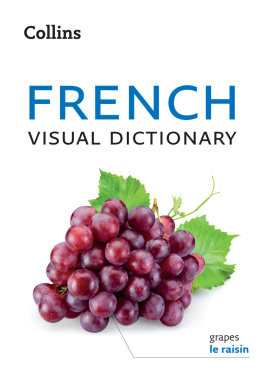
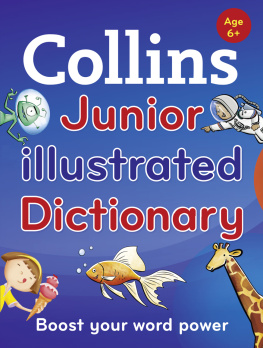

 @Collins4Parents Acknowledgements We would like to thank those authors and publishers who kindly gave permission for copyright material to be used in the Collins Corpus. We would also like to thank Times Newspapers Ltd for providing valuable data.
@Collins4Parents Acknowledgements We would like to thank those authors and publishers who kindly gave permission for copyright material to be used in the Collins Corpus. We would also like to thank Times Newspapers Ltd for providing valuable data. A pronunciation shows you how to say a difficult word. A word history tells you where a word originally came from.
A pronunciation shows you how to say a difficult word. A word history tells you where a word originally came from.  Some entries have a related word , such as a noun, adjective, or adverb made from the headword. Synonyms , or words that you can use instead, are given for some words.
Some entries have a related word , such as a noun, adjective, or adverb made from the headword. Synonyms , or words that you can use instead, are given for some words. Other features of this dictionary Some headwords can be spelt in more than one way. medieval ; also spelt mediaeval age ages, ageing or aging, aged Sometimes definitions include a label, such as FORMAL , INFORMAL , or TRADEMARK . This tells you a little more about the word or how it is used. mum mums NOUN INFORMAL mother Sometimes a photo or an illustration is included. mollusc molluscs NOUN an animal with a soft body and no backbone.
Other features of this dictionary Some headwords can be spelt in more than one way. medieval ; also spelt mediaeval age ages, ageing or aging, aged Sometimes definitions include a label, such as FORMAL , INFORMAL , or TRADEMARK . This tells you a little more about the word or how it is used. mum mums NOUN INFORMAL mother Sometimes a photo or an illustration is included. mollusc molluscs NOUN an animal with a soft body and no backbone. Grammar and spelling tips provide extra information on the spelling or use of words. different ADJECTIVE If one thing is different from another, it is not like it.
Grammar and spelling tips provide extra information on the spelling or use of words. different ADJECTIVE If one thing is different from another, it is not like it.  There are two e s in different . Some definitions tell you where to find more information at another headword. convex ADJECTIVE A convex surface bulges outwards, rather than being level or curving inwards.
There are two e s in different . Some definitions tell you where to find more information at another headword. convex ADJECTIVE A convex surface bulges outwards, rather than being level or curving inwards.